2010加拿大联邦报税细则
加拿大商法
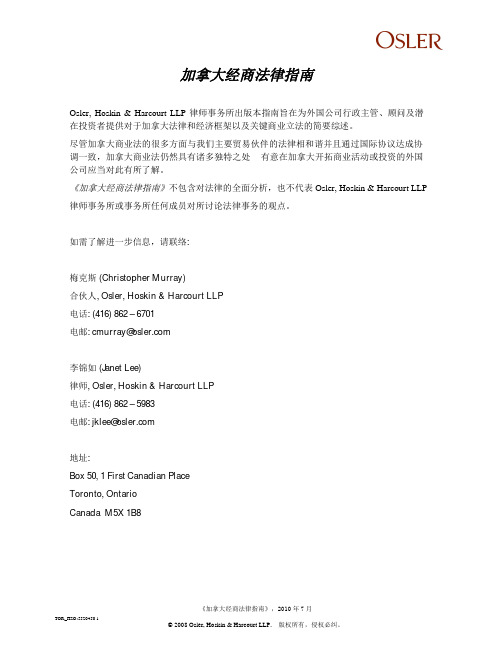
分公司与子公司的不同
地址: Box 50, 1 First Canadian Place Toronto, Ontario Canada M5X 1B8
TOR_H2O:5520450.1
《加拿大经商法律指南》,2010 年 7 月 © 2008 Osler, Hoskin & Harcourt LLP. 版权所有,侵权必纠。
加拿大宪法
加拿大宪法为国家最高法律。宪法制订民主政府的基本原则并且定义政府的三个不同分支——行 政、立法及司法。宪法还划分联邦政府和省政府的立法权力及责任。联邦政府负责的领域有:外 交事务和国际贸易、防御、货币体系、刑法、专利、破产/资不抵债以及某些“全国性”领域,如金 融服务以及电信。省政府负责教育、医疗保健、市政、证券规章、国有资源以及其他领域。 加拿大的《人权与自由宪章》(简称《宪章》)——自从 1982 年以来引起过数次重要法律争议—— 也包括在宪法内。与美国的《人权宣言》不同,《宪章》对于经济权力的干预有限。
《加拿大经商法律指南》,2010 年 7 月
Osler, Hoskin & Harcourt LLP
加拿大的集体诉讼
加拿大的多数省份——包括人口最稠密的安大略省和魁北克省——都有适用于集体诉讼的法规。 即便在其他司法辖区,亦可代表很多人提起诉讼,我们通常称之为“代表”诉讼。 加拿大(尤其是在魁北克省)对集体诉讼持相对欢迎的态度。过去十年内加拿大集体诉讼数量猛 增,使得代理原告的律师队伍不断扩大,律师经验日益丰富。现在在许多省份同时协调一致地提 起类似诉讼、或在加拿大提起与在他国进行的诉讼一致的诉讼已不再稀奇。
加拿大入境申报卡的填写方法和免税限额

加拿大入境申报卡的填写方法和免税限额第一篇:加拿大入境申报卡的填写方法和免税限额1.你需要在进入加拿大的第一个口岸(温哥华或多伦多)清关,办理入境和行李检查。
完成后再转往你的目的地-2.在降落前,空乘会派发报关表格(E-311).要注意,这张表格不可摺叠,必须保持直板使用。
3.这张表格可以供居住在同一地址的家庭成员(不超过4人)共同使用。
所以名单是4格,每人一格。
PART A======Last name(姓)First name(名)Initial(外国人的中间名字简写,中国人没有)以英文大写填写,先写姓,后写名字,(照护照上的抄录)每个字之间空一格。
,Date of Birth(出生日期)格式是YY-MM-DD(年月日,以阿拉伯数字填写,不够两位数的要补“0”);Citizenship(国籍中国CHINESE)4.HOME ADDRESS(家庭住址)Number, street, apartment No.(街道号码,公寓号码)City/T own(城市)Prov./State(省名);Country(国家)Postal/Zip code(邮编)。
把有关资料写在相应位置。
如果护照有这些资料,就抄写上去。
5。
Arriving by: 如何到达,乘飞机选择 AIR 在方格内打叉(X),这里不打勾,只会打“X”Airline/flight No., train No.or vessel name 这里填写航班号码。
登记证上面有。
下面有选择题:I am/we are bringing into Canada: Yes No(我,我们携带。
进入加拿大)是否Firearms or other weapons 火器或其他军火(e.g.switchblades, Mace or pepper spray).Commercial goods, whether or not for resale商业货品,即便不做转售(e.g.samples, tools, equipment).Meat/meat products;dairy products;fruits;vegetables;seeds;nuts;plants and animals or theirparts/products;cut flowers;soil;wood/woodproducts;birds;insects.肉,肉制品,奶类制品,水果,蔬菜,种子,坚果;植物及动物或它们的部分/制品,剪下的花朵;泥土;木材/木制品;鸟,昆虫。
加拿大登陆指南
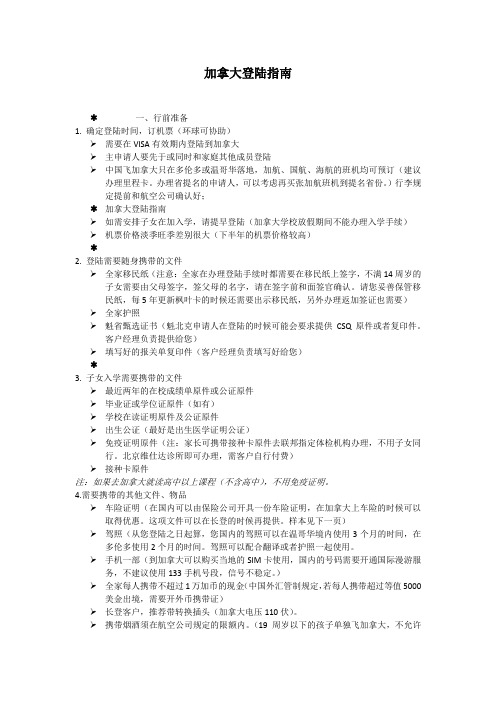
加拿大登陆指南←一、行前准备1. 确定登陆时间,订机票(环球可协助)需要在VISA有效期内登陆到加拿大主申请人要先于或同时和家庭其他成员登陆中国飞加拿大只在多伦多或温哥华落地,加航、国航、海航的班机均可预订(建议办理里程卡。
办理省提名的申请人,可以考虑再买张加航班机到提名省份。
)行李规定提前和航空公司确认好;←加拿大登陆指南如需安排子女在加入学,请提早登陆(加拿大学校放假期间不能办理入学手续) 机票价格淡季旺季差别很大(下半年的机票价格较高)←2. 登陆需要随身携带的文件全家移民纸(注意:全家在办理登陆手续时都需要在移民纸上签字,不满14周岁的子女需要由父母签字,签父母的名字,请在签字前和面签官确认。
请您妥善保管移民纸,每5年更新枫叶卡的时候还需要出示移民纸,另外办理返加签证也需要) 全家护照魁省甄选证书(魁北克申请人在登陆的时候可能会要求提供CSQ原件或者复印件。
客户经理负责提供给您)填写好的报关单复印件(客户经理负责填写好给您)←3. 子女入学需要携带的文件最近两年的在校成绩单原件或公证原件毕业证或学位证原件(如有)学校在读证明原件及公证原件出生公证(最好是出生医学证明公证)免疫证明原件(注:家长可携带接种卡原件去联邦指定体检机构办理,不用子女同行。
北京维仕达诊所即可办理,需客户自行付费)接种卡原件注:如果去加拿大就读高中以上课程(不含高中),不用免疫证明。
4.需要携带的其他文件、物品车险证明(在国内可以由保险公司开具一份车险证明,在加拿大上车险的时候可以取得优惠。
这项文件可以在长登的时候再提供。
样本见下一页)驾照(从您登陆之日起算,您国内的驾照可以在温哥华境内使用3个月的时间,在多伦多使用2个月的时间。
驾照可以配合翻译或者护照一起使用。
手机一部(到加拿大可以购买当地的SIM卡使用,国内的号码需要开通国际漫游服务,不建议使用133手机号段,信号不稳定。
)全家每人携带不超过1万加币的现金(中国外汇管制规定,若每人携带超过等值5000美金出境,需要开外币携带证)长登客户,推荐带转换插头(加拿大电压110伏)。
“万税之国”的税收与福利

“万税之国”的税收与福利作为高福利国家之一的加拿大同时也是一个“万税之国”,从个人所得税到地税,从消费税到资本所得利润税等,样样都少不了。
在2015年时,加拿大媒体有个惊人发现:居住在卑诗省某市的一个家庭每月可领43160加元之多的福利金。
原来,这家父亲是个一夫多妻主义者,由于有24个妻子,所以拥有133个子女,年龄范围从婴儿到成人都有,难怪每月能领到数额如此庞大的一笔福利金。
按照这种福利逻辑,我们是否可以打个广告:如果您穷的话,就来加拿大生孩子吧,真的赚大了!这事一经报道,便引起媒体广泛讨论,(我们暂且不谈事主是否涉嫌重婚罪的问题,这不是今天话题重点)毕竟他家一个月的福利差不多相当于一个中等收入之人一年的薪水,国家负担也太重了点吧?再说,国家福利也是靠咱纳税人的钱支撑着的啊。
看了这个故事,是不是有人会说“加拿大福利这么好”?“福利”和“税收”一对欢喜冤家古罗马著名政治家西塞罗说“税收是国家的支柱”,然而,无论何时纳税却是最不受人民待见的一项义务。
1988年乔治?布什当选不知道是不是因为那句“听好了,不加税”的竞选口号深得民心。
而西方国家的每次竞选,候选人都喜欢拿减免?负提高福利作为拉选票的筹码。
作为高福利国家之一的加拿大同时也是一个“万税之国”,从个人所得税到地税,从消费税到资本所得利润税等,样样都少不了。
那么,加拿大人税赋到底有多重呢?卑诗菲沙研究所最近用具?w数据告诉我们答案:总税率相当于年收入的42.5%。
2015年收入8.3万加元的普通家庭,3.5万用于交税,用于支付联邦、省和地方个税、工资税、销售税和房产税等,相比之下,普通家庭仅用年入37%支付日常生活所需,一年下来,花在衣食住行(租金、房贷、食品和穿衣等)方面的支出(3.1万)还没有交?多。
据加拿大统计局数据显示,自上世纪60年代早期,加拿大普通家庭一年赋税仅占年入近三分之一,日常生活所需支出占年入近三分之二。
1961年以来至今,加人税赋上升2000%多,涨速远超许多消费品,同期消费者物价指数(CPI,吃饭、穿衣、住房、交通、医疗及个人护理、教育及其他平均价格指数)仅涨718%。
加拿大的社会福利有哪些呢
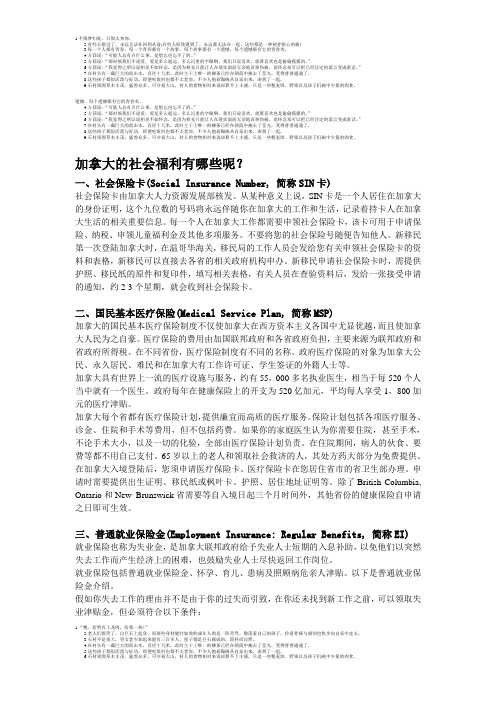
5.方茴说:“那时候我们不说爱,爱是多么遥远、多么沉重的字眼啊。
我们只说喜欢,就算喜欢也是偷偷摸摸的。
”6.方茴说:“我觉得之所以说相见不如怀念,是因为相见只能让人在现实面前无奈地哀悼伤痛,而怀念却可以把已经注定的谎言变成童话。
”7.在村头有一截巨大的雷击木,直径十几米,此时主干上唯一的柳条已经在朝霞中掩去了莹光,变得普普通通了。
8.这些孩子都很活泼与好动,即便吃饭时也都不太老实,不少人抱着陶碗从自家出来,凑到了一起。
9.石村周围草木丰茂,猛兽众多,可守着大山,村人的食物相对来说却算不上丰盛,只是一些粗麦饼、野果以及孩子们碗中少量的肉食。
遗憾,每个遗憾都有它的青春美。
4.方茴说:“可能人总有点什么事,是想忘也忘不了的。
”5.方茴说:“那时候我们不说爱,爱是多么遥远、多么沉重的字眼啊。
我们只说喜欢,就算喜欢也是偷偷摸摸的。
”6.方茴说:“我觉得之所以说相见不如怀念,是因为相见只能让人在现实面前无奈地哀悼伤痛,而怀念却可以把已经注定的谎言变成童话。
”7.在村头有一截巨大的雷击木,直径十几米,此时主干上唯一的柳条已经在朝霞中掩去了莹光,变得普普通通了。
8.这些孩子都很活泼与好动,即便吃饭时也都不太老实,不少人抱着陶碗从自家出来,凑到了一起。
9.石村周围草木丰茂,猛兽众多,可守着大山,村人的食物相对来说却算不上丰盛,只是一些粗麦饼、野果以及孩子们碗中少量的肉食。
加拿大的社会福利有哪些呢?一、社会保险卡(Social Insurance Number, 简称SIN卡)社会保险卡由加拿大人力资源发展部核发。
从某种意义上说,SIN卡是一个人居住在加拿大的身份证明,这个九位数的号码将永远伴随你在加拿大的工作和生活,记录着持卡人在加拿大生活的相关重要信息。
每一个人在加拿大工作都需要申领社会保险卡,该卡可用于申请保险、纳税、申领儿童福利金及其他多项服务。
不要将您的社会保险号随便告知他人。
新移民第一次登陆加拿大时,在温哥华海关,移民局的工作人员会发给您有关申领社会保险卡的资料和表格,新移民可以直接去各省的相关政府机构申办。
(完整word版)国际税法
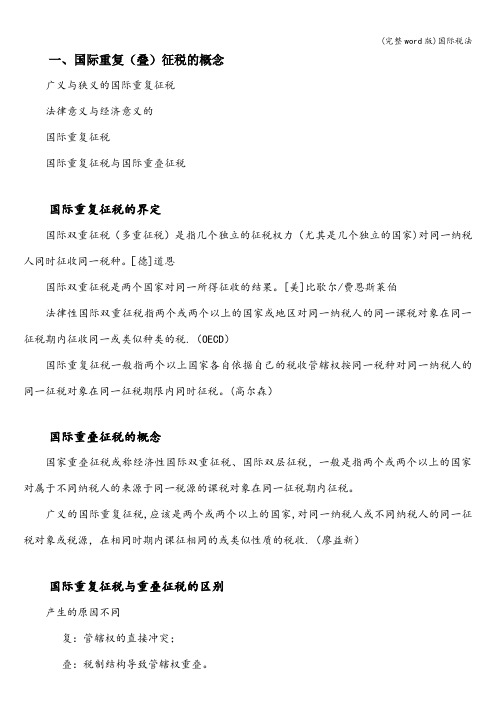
一、国际重复(叠)征税的概念广义与狭义的国际重复征税法律意义与经济意义的国际重复征税国际重复征税与国际重叠征税国际重复征税的界定国际双重征税(多重征税)是指几个独立的征税权力(尤其是几个独立的国家)对同一纳税人同时征收同一税种。
[德]道恩国际双重征税是两个国家对同一所得征收的结果。
[美]比歇尔/费恩斯莱伯法律性国际双重征税指两个或两个以上的国家或地区对同一纳税人的同一课税对象在同一征税期内征收同一或类似种类的税.(OECD)国际重复征税一般指两个以上国家各自依据自己的税收管辖权按同一税种对同一纳税人的同一征税对象在同一征税期限内同时征税。
(高尔森)国际重叠征税的概念国家重叠征税或称经济性国际双重征税、国际双层征税,一般是指两个或两个以上的国家对属于不同纳税人的来源于同一税源的课税对象在同一征税期内征税。
广义的国际重复征税,应该是两个或两个以上的国家,对同一纳税人或不同纳税人的同一征税对象或税源,在相同时期内课征相同的或类似性质的税收.(廖益新)国际重复征税与重叠征税的区别产生的原因不同复:管辖权的直接冲突;叠:税制结构导致管辖权重叠。
纳税主体不同复:同一纳税主体;叠:不同纳税主体.其他方面的诸多差异复:没有国内重复征税,有时只涉及自然人,而与公司无关;税种上可能只涉及同一税种。
叠:既有国内、又有国际重叠,涉及的纳税人中,至少有一个为公司。
税种上则有可能涉及不同税种。
二、解决国际重复征税的方法划分征税权免税法与抵免法扣除法与减税法(一)免税法免税法也称外国税收豁免(Foreign tax exemption),是指居住国对本国居民来源于境外的所得或财产免于征税。
如果一国对本国居民来源于境外的所得或财产免于征税不附加任何条件,是为无条件免税或完全免税,这无异于仅实行来源地税收管辖权.如果一国对本国居民纳税人来源于境外的、符合特定条件的所得或财产免税,是为有条件免税或部分免税。
免税的条件给予免税的国外所得必须来自于课征与本国相似的所得税的国家,而对来自不征收所得税或税率很低的国际避税地的所得不给予免税;享受免税的国外所得一般应为本国纳税人在国外分公司的利润或从参股比重达到一定比例的国外企业分得的股息、红利;持有国外企业的股息还必须达到规定的最短期限。
加拿大进口清关具体流程

加拿大进口清关具体流程中国作为加拿大的贸易伙伴,近年来,两国之间的贸易往来越来越频繁,作为一位外贸人,清楚加拿大的进口清关具体流程要求十分重要。
一、加拿大海关通关详解加拿大边境服务署(Canada Border Services Agency,即CBSA,以下简称“加拿大海关”)重点保障国家安全和公共安全,促进人员和货物的自由流动(包括符合相关立法规范的动植物的进出口)。
近年来,加拿大海关实施了PIP计划(Partnersin Protection),希望在海关与企业之间建立更好的合作关系来加强边境管理和供应链安全。
这一项目是免费的,其目标在于通过降低风险、事先认证的企业给予“授权的贸易商”资质,从而简化其进口通关流程。
二、通关基本程序1.进口前准备出口到加拿大的货物,无论是个人还是企业都应该事先向加拿大税务署(CRA)申请商业代码(BN)以设立进出口账户,然后进口商应该进行货物的确认,并获取产品的相关信息以及可能情况下获取样品。
在此基础上,进口商应确定货物的原产地,并且确认货物涉及的许可管理的情况。
进口商需要根据自身的情况,确定是否需要聘请报关公司代理报关。
2.将货物进行归类需要确定10位商品编码,通常情况下,可以通过以下渠道获得商品税则归类信息:直接向海关咨询;可以联系边境信息服务中心(Border InformationServices,BIS);可以通过邮件向海关的贸易办公室申请获得关于税则归类的行政裁定。
3.确定税费在确定进口货物所适用的税率之前,需要先确定货物可以享受的关税待遇。
加拿大海关目前有9种关税税率,根据税率由高到低排列如下:普通关税→*惠国关税→大英优惠关税(BPT)→普惠制关税(GPT)→*不发达的发展中国家关税(LDDCT)→加勒比海关国家关税(CCTA)→墨西哥-美国关税(MUST)→墨西哥关税(MT)→美国关税(UST)。
加拿大主要有惠国待遇(MFN)和可适用的优惠关税待遇除了进口关税外,根据加拿大消费税法的规定,大部分进口货物在进口时应缴纳5%的商品劳务税(GST)。
2010年国税函类税收文件

2010年国税函类税收文件【企业】国税函[2010]612号关于美国船级社企业所得税待遇问题的通知【内部】国税函[2010]587号关于做好统一内外资企业和个人城市维护建设税和教育费附加制度有关工作的通知【系统】国税函[2010]585号关于做好增值税防伪税控开票系统升级工作的通知【内部】国税函[2010]543号关于转发《财政部环境保护部关于调整环境标志产品政府采购清单的通知》的通知【发票】国税函[2010]539号关于西安世界园艺博览会冠名定额发票跨省市使用问题的批复【个人】国税函[2010]538号关于明天小小科学家奖金免征个人所得税问题的通知【系统】国税函[2010]513号关于定点联系企业税务风险管理信息系统有关问题的通知【营业】国税函[2010]485号关于部分纳税人对第16届亚运会提供服务赞助有关营业税问题的通知【内部】国税函[2010]471号转发《财政部国家发展改革委关于调整节能产品政府采购清单的通知》的通知【综合】国税函[2010]455号关于核查国家认定企业技术中心初评通过企业依法纳税情况的通知【出口】国税函[2010]375号关于下发出口商品退税率文库20100715B版的通知【企业】国税函[2010]323号关于开展同期资料检查的通知【出口】国税函[2010]303号关于跨境贸易人民币结算试点企业评审以及出口货物退(免)税有关事项的通知【营业】国税函[2010]300号关于国际电信业务营业税问题的通知【协定】国税函[2010]290号关于《非居民享受税收协定待遇管理办法(试行)》有关问题的补充通知【企业】国税函[2010]266号关于境外分行取得来源于境内利息所得扣缴企业所得税问题的通知【企业】国税函[2010]256号关于环境保护节能节水安全生产等专用设备投资抵免企业所得税有关问题的通知【协定】国税函[2010]255号关于印发《中华人民共和国政府和芬兰共和国政府对所得避免双重征税和防止偷漏税的协定》及议定书文本并请做好执行准备的通知【企业】国税函[2010]249号关于2009年度企业所得税纳税申报有关问题的通知【协定】国税函[2010]273号关于韩国金融公司适用中韩税收协定利息条款免税待遇的通知【土地】国税函[2010]220号关于土地增值税清算有关问题的通知【消费】国税函[2010]205号关于稳定轻烃产品征收消费税问题的批复【企业】国税函[2010]201号关于房地产开发企业开发产品完工条件确认问题的通知【企业】国税函[2010]196号关于电信企业坏账损失税前扣除问题的通知【出口】国税函[2010]195号关于停止海关代征进口产品增值税信息录入工作的通知【企业】国税函[2010]185号关于小型微利企业预缴2010年度企业所得税有关问题的通知【企业】国税函[2010]184号关于中国工商银行股份有限公司等企业企业所得税有关征管问题的通知【内部】国税函[2010]181号关于转发《财政部环境保护部关于调整环境标志产品政府采购清单的通知》的通知【内部】国税函[2010]180号关于进一步做好税收促进节能减排工作的通知【管理】国税函[2010]173号关于增值税一般纳税人抗震救灾期间增值税扣税凭证认证稽核有关问题的通知【管理】国税函[2010]164号关于支持青海玉树地震灾区恢复重建有关税收征管问题的通知【出口】国税函[2010]162号关于外贸企业丢失增值税专用发票抵扣联出口退税有关问题的通知【内部】国税函[2010]158号关于加强社会保险费收入统计和分析工作的通知【企业】国税函[2010]157号关于进一步明确企业所得税过渡期优惠政策执行口径问题的通知【企业】国税函[2010]156号关于跨地区经营建筑企业所得税征收管理问题的通知【企业】国税函[2010]150号关于广西中金矿业有限公司转让股权企业所得税收入确认问题的批复【企业】国税函[2010]148号关于做好2009年度企业所得税汇算清缴工作的通知【增值】国税函[2010]144号关于橄榄油适用税率问题的批复【增值】国税函[2010]139号关于明确《增值税一般纳税人资格认定管理办法》若干条款处理意见的通知【增值】国税函[2010]138号关于印发《增值税一般纳税人资格认定管理办法》宣传材料的通知【增值】国税函[2010]137号关于《增值税一般纳税人资格认定管理办法》政策衔接有关问题的通知【个人】国税函[2010]130号关于中华宝钢环境优秀奖奖金免征个人所得税问题的通知【增值】国税函[2010]126号关于新认定增值税一般纳税人使用增值税防伪税控系统有关问题的通知【内部】国税函[2010]119号关于转发《财政部发展改革委关于调整节能产品政府采购清单的通知》的通知【内部】国税函[2010]107号关于加强税务稽查办案专项经费管理的通知【增值】国税函[2010]97号关于人工合成牛胚胎适用增值税税率问题的通知【出口】国税函[2010]91号关于生产企业出口外购视同自产应税消费品消费税退税问题的批复【出口】国税函[2010]89号关于出口企业延期提供出口收汇核销单有关问题的通知【企业】国税函[2010]86号关于新办文化企业企业所得税有关政策问题的通知【企业】国税函[2010]79号关于贯彻落实企业所得税法若干税收问题的通知【个人】国税函[2010]78号关于全国职工职业技能大赛奖金免征个人所得税的通知【消费】国税函[2010]76号关于对绝缘油类产品征收消费税问题的批复【增值】国税函[2010]75号关于粕类产品征免增值税问题的通知【外企】国税函[2010]69号关于政府关停外商投资企业所得税优惠政策处理问题的批复【协定】国税函[2010]68号关于日本政策金融公库享受协定待遇的通知【出口】国税函[2010]64号关于下发出口商品退税率文库20100201A版的通知【增值】国税函[2010]56号关于折扣额抵减增值税应税销售额问题通知【协定】国税函[2010]46号关于税收协定有关条款执行问题的通知【企业】国税函[2010]39号关于建筑企业所得税征管有关问题的通知【增值】国税函[2010]35号关于办理2009年销售额超过标准的小规模纳税人申请增值税一般纳税人认定问题的通知【个人】国税函[2010]23号关于限售股转让所得个人所得税征缴有关问题的通知【协定】国税函[2010]9号关于执行《中华人民共和国政府和新加坡共和国政府关于对所得避免双重征税和防止偷漏税的协定》第二议定书有关问题的通知【内部】国税函[2010]8号转发《财政部关于中央预算单位2010年深化国库集中支付改革若干问题的通知》的通知【出口】国税函[2010]1号关于出口货物退(免)税有关问题的通知。
加拿大 税法解释

加拿大税法解释加拿大税种:印花税,消费税,营业税,其他税,税收征管,企业所得税,个人所得税。
加拿大税制综述加拿大实行三级税收制度:联邦、省(或地区)和地方。
联邦和省级政府拥有相对独立的税收立法权,地方税收立法权由省级政府赋予。
省级税收立法权不能与联邦税收立法权相违背。
加拿大是联邦和地方税分权国家,类似美国。
加拿大现行税制中的主要税种有:公司所得税及附加税、个人所得税及附加税、商品劳务税(增值税)、社会保障税、资本税、销售税、关税、特别倾销税、矿产税、土地和财产税等。
联邦一级以个人所得税为主,辅之以社会保障税和商品劳务税;省级以个人所得税和商品劳务税为主,辅之以社会保障税;地方税以财产税为主。
工商管理加拿大公司制度在工商管理方面,加拿大各级政府都有不同的权限。
对商业的管理主要来自省级政府。
省工商部门负责公司成立的注册事项,包括个体公司(sole proprietorship)、合伙公司(partnership)和 (corporation)。
另外,各省还对特定的行业进行管理,并要求有关商家办理行业执照。
在大多数情况下,任何个人或公司有权从事某一行业,不需申请营业执照或许可;但是如果该行业属于政府管理并要求持有执照或许可证的,应事先取得后才能经营。
一般来说,属于省级政府管辖,并需行业执照的生意包括食品,药品,酒类,房地产,机动车辆,旅行服务(包括旅行社和饭店)等。
省政府对商业活动的管理还包括环保、消费者权益、工作时间、雇佣关系、劳工意外赔偿等等。
各市级政府对在其管辖区上商业活动,也有种种规定,主要包括:营业时间和地点,噪音对市民的影响,食品卫生及废物处理,土地使用,房地产税,建筑施工的许可等。
加拿大联邦政府对也提供公司注册服务,使之成为联邦公司,受联邦公司法管辖。
除少数行业必须注册为联邦公司外,大多数行业可以自己选择是注册为联邦或是注册为省。
在商业活动的管理上,联邦权限包括食品药品的检验、环保、商品安全、知识产权保护、公平竞争、进出口、度量衡等等。
八大国家个税征收比较

八大国家个税征收比较2011年03月26日14:52 来源:羊城晚报个税改革,是近期的热点话题,像个税起征点的确定,就引起许多讨论,让我们来看看外国个税是怎样征的?个人所得税是典型的“出口转内销”。
中国新朝皇帝王莽在公元前10年就制定了具有现代意义的个税,规定熟练的劳动者要把个人收益的十分之一纳税,而在这之前,税都是人头税或财产税。
英国从1798年才开始征收个税,按照家庭年收入采取累进税率征收(把收入由低到高依次分成几个等级,各级税率不同,依次提高),对年收入超过60英镑部分每英镑征收2便士,超过200英镑部分每英镑征收2先令。
英国在1799年征收个税600万英镑(约合2007年的51.2亿英镑)。
现在,世界绝大多数国家都征收个税,多采用累进税率按家庭年收入计征。
对工薪族来说,领工资就纳税。
根据经合组织发布的数据,2008年29个工业化国家最低收入平均为140451人民币元/年,人均GDP平均为311554人民币元,中央政府个税“起征点”平均为56003人民币元/年,个税起征点是最低收入的40%,是人均GDP的17%。
美国:领工资就纳税,最高税率为46%美国联邦政府于1913年建立了以家庭户为纳税单位、按年度收入个人自主申报的个税制度。
美国宪法明确规定了税收“用以偿付国债并为合众国的共同防御和全民福利提供经费”,全民福利是美国税收的主要归宿之一。
美国联邦政府、州政府和地方政府重复征收个税,但大头是联邦政府。
20世纪初期,联邦个税税级多达50多个,在第二次世界大战期间,联邦个税最高税率达94%,战后18年间,联邦个税最低税率一直保持在20%上下,最高税率则保持在90%上下。
在美国,即使有1美元的收入,也要纳税。
个人收入指家庭一年内的所有收入,包括工资、营业利润、股票收益、基金利息、小费、佣金等,也包括投资房地产一年内的收入,超过一年按资本收入税率另计。
在年度报税时,会有各种免税项,这相当于对家庭的福利补贴,如赡养费、儿童抚养费、学费、慈善捐款、自由职业者业务开销减免等,报税时要把这部分免税额在总收入里扣除,剩余部分才是应税收入。
加拿大主要税收介绍

加拿大主要税收介绍加拿大税收制度非常完善合理,主要分为以下几个主要税种。
加拿大实行全球征税制度,即移民在成为加拿大永久居民或公民后,在海外获得的收入需要向加拿大报税。
(移民前赚的钱带入加拿大不需要再交税。
)已入籍成为加拿大公民的客人,很想回国或去他国发展自己的事业但又不愿意将所得再在加拿大上税而且想自由进出加拿大,那解决的办法就是申请成为加拿大非税务居民,详细情况可咨询我们。
销售税(联邦商品服务税GST+省销售税PST)商品服务税﹙GST﹚,类似于中国的增值税,如果企业一年营业额在30,000加元以下,可以不注册,否则每次销售或收服务费就要加7%的GST。
不过注了GST号码后,企业进货、租房所付出的GST可以退回。
加拿大各省有不同税率的省销售税﹙PST﹚,从0至8%不等。
无论企业营业额多寡,公司须申请PST号码,向客户征收PST。
这种税相当于中国的营业税,但征收范围比营业税大。
公司所得税依据加拿大政府关于所得税的法规,联邦政府与省政府均有权征收所得税,目前联邦政府对公司应征税收入的基本税率为28.84%﹙包括附加税﹚;而大部分省的基本税率介乎14.5%与17%之间﹙魁北克省除外﹚,所以合并税率介乎43%至46%间﹙魁北克省大约为38%﹚。
另外,由加拿大人控制的私人企业及从事制造加工活动的企业,可按规定在一般税率上获得扣减。
会计年度不一定按日历年度,也不一定和税务年度一致,税法对会计年度的唯一限制是不能超过53周。
加拿大税法相对复杂,具体情况请咨询当地会计师。
个人所得税1、个人收入税的征税对象加拿大个人收入税的主要征税对象是“税务居民”。
作为一个税务居民,在世界各地的入息都要向加拿大报税。
“税务居民”不同于“移民”或“公民”,它的定义主要考虑以下几个因素:1、日常居住地点;2、与加拿大或外地的居住关系(Residential Ties);3、逗留加拿大时间的长短。
“税务居民”包括在外地居住但与加拿大有居住关系的人士。
促进创意产业发展的税收政策研究

促进创意产业发展的税收政策研究摘要:随着创意经济的兴起,创意产业将成为最具活力的产业部门,而近几年影视行业在中国发展尤为显著。
文章从中国目前影视业的税收政策入手,阐述了中国现代影视业发展中税收政策存在的问题,并通过其他几个国家影视业税收政策分析,提出一些我国发展影视业应采取的财税政策措施的建议。
关键词:影视业;税收政策;实际税率一、引言税收是国家调节经济,实行政策倾斜的有力杠杆,良好的税收政策是促进经济发展、产业结构升级的基础,它为企业的各项投资经营行为提供政策上的依据与参考,引导各种资源的均衡配置。
政府采取税收优惠政策的主要目的是牺牲税收的收入,促进经济与产业的长期发展。
待经济与产业成长之后,又可使政府的税收逐年增长。
创意产业在全世界范围内日益扩张,成为推动经济增长的重要力量,虽然中国现行税收政策对文化事业和创意产业的发展起到了一定的促进作用,但优惠导向不明确、优惠方式单一、优惠力度缺乏激励等问题的存在,妨碍创意产业的快速发展,急需改进。
2010年中国文化创意产业中广播、电影、电视行业比重最高,为37.1%,收入超过1800亿元。
近几年中国大量国有影视企业通过转体改制释放了巨大的能量,如中影集团、上影集团,纷纷取得了瞩目的市场表现成绩。
2002年后,随着民营资本进入电影行业,涌现出一大批凭借着体制、资本、人才迅速发展的民营电影公司,如保利华亿传媒、光线传媒、华谊兄弟等。
本文以创意产业中的影视行业为例,分析税收政策对于创意产业的影响以及一些政策建议。
二、国外促进影视行业发展税收政策的经验各国为了促进创意产业的发展,均实施了一系列税收优惠政策。
通过对美国、加拿大、法国以及澳大利亚等国的影视行业税收政策进行解读,以期获得一些经验。
(一)美国几十年以来,美国好莱坞电影产业一直是国际电影市场上的主导力量。
据统计,美国电影出口额在所有出口产品中位居第二,仅次于航空产品。
从20世纪70年代开始,美国税法提供的税收优惠吸引了大量的个人投资者,投入到电影摄制的资金可以在短期内提前折旧,同时也可以作为报税时的预扣金额。
国税发〔2010〕75号中华人民共和国政府和新加坡共和国政府关于对所得避免双重征税和防止偷漏税的协定〉及议

国家税务总局关于印发•†中华人民共和国政府和新加坡共和国政府关于对所得避免双重征税和防止偷漏税的协定‡及议定书条文解释‣的通知--------------------------------------------------------------------------------国税发…2010‟75号全文有效成文日期:2010-07-26各省、自治区、直辖市和计划单列市国家税务局、地方税务局:2007年7月11日,中国与新加坡签署了新的政府间对所得避免双重征税和防止偷漏税的协定及其议定书,2009年8月24日,双方签署了该协定的第二议定书。
该协定及其议定书以及第二议定书(以下统称“中新协定”)已分别于2008年1月1日与2009年12月11日起执行。
根据中新协定、•维也纳条约法公约‣、•中华人民共和国企业所得税法‣及其实施条例、•中华人民共和国个人所得税法‣及其实施条例,国家税务总局制定了•中华人民共和国政府和新加坡共和国政府关于对所得避免双重征税和防止偷漏税的协定‣及议定书条文解释(以下简称中新协定条文解释),现印发给你们,请遵照执行。
在执行中新协定条文解释规定时,应注意:一、我国对外所签协定有关条款规定与中新协定条款规定内容一致的,中新协定条文解释规定同样适用于其他协定相同条款的解释及执行;二、中新协定条文解释与此前下发的有关税收协定解释与执行文件不同的,以中新协定条文解释为准;三、各地税务机关要组织有关干部认真学习中新协定条文解释,并在此基础上正确理解与执行税收协定;四、对执行中存在的问题请及时层报税务总局(国际税务司)。
国家税务总局二○一○年七月二十六日•中华人民共和国政府和新加坡共和国政府关于对所得避免双重征税和防止偷漏税的协定‣及议定书条文解释第一条人的范围第一条确定协定适用的范围为“缔约国一方或同时为双方居民的人”。
本规定有三层含义。
第一,协定适用于“人”;第二,这些人必须是居民;第三,这些身为居民的人必须属于缔约国一方或双方。
史上最全加拿大报税指南!概要
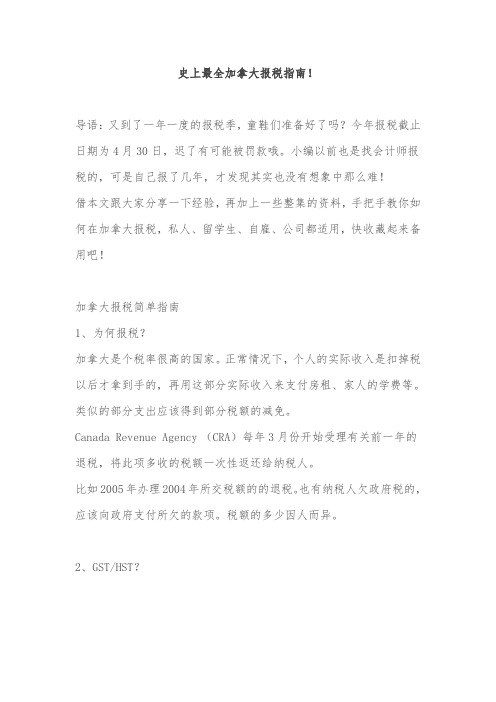
史上最全加拿大报税指南!导语:又到了一年一度的报税季,童鞋们准备好了吗?今年报税截止日期为4月30日,迟了有可能被罚款哦。
小编以前也是找会计师报税的,可是自己报了几年,才发现其实也没有想象中那么难!借本文跟大家分享一下经验,再加上一些整集的资料,手把手教你如何在加拿大报税,私人、留学生、自雇、公司都适用,快收藏起来备用吧!加拿大报税简单指南1、为何报税?加拿大是个税率很高的国家。
正常情况下,个人的实际收入是扣掉税以后才拿到手的,再用这部分实际收入来支付房租、家人的学费等。
类似的部分支出应该得到部分税额的减免。
Canada Revenue Agency(CRA)每年3月份开始受理有关前一年的退税,将此项多收的税额一次性返还给纳税人。
比如2005年办理2004年所交税额的的退税。
也有纳税人欠政府税的,应该向政府支付所欠的款项。
税额的多少因人而异。
2、GST/HST?Goods and Services Tax/Harmonized Sales Tax(GST/HST)Return 是跟商品消费有关的退税。
一般从7月开始,分4个季度退还给纳税人。
数额也是因人而异,总额不超过350加币。
3、谁可以报税?只要在去年的最后一天进入加拿大居留的人,不论本国人还是外国人,只要有加拿大盈利机构公司/单位发出的正式的税务单,比如在读学生的T2202A学费表、TA和其他雇员的T4和T4A收入表;T5存款利息表以及T3投资收益表等,都可以申请报税4、何时报税?CRA每年3月份开始受理退税申请,4月底之前递交的申请可以很快处理,如果没有问题,可以在2周之内完成。
5月份之后的处理速度很低。
从前一年倒推到以前任何一个税务年,没有办理的报税统统都可以在一年办理。
比如2002年到加拿大,一直到2004年的税都没有办理,那么在2005年可以办理2002到2004年的报税5、报税需要的资料?如前所述,比如在读学生的T2202A学费表、TA和其他雇员的T4和T4A收入表;T5存款利息表以及T3投资收益表等,都可以申请报税。
加拿大移民手册1-加拿大家园论坛

加拿大移民手册11 加拿大形成发展简介2 加拿大文化发展3 加拿大政治4 加拿大联邦政府机构网址5 加拿大教育6 加拿大经济7 加拿大文化8 加拿大法律9 加拿大旅游10 申请社会福利11 儿童健康护照12 退休储蓄RRSP计划13 退休投资储蓄的要诀14 就业保险计划修改15 加拿大的货币制度16 第一年报税须知17 自雇报税十大技巧18 新移民的税务常识19 售房指南20 新移民购房指南21 房屋保险22 写给新移民:我们就是主人23 新移民要感谢加拿大24 加拿大历史大事年表25 魁省地理介绍26 移民加拿大辩论会27 新移民入境手册28 心理素质与移民适应29 新移民入境报到注意事项30 加拿大新移民定居三步曲31 多伦多生活指南32 加拿大的郁金香节33 浅谈加拿大的唐人街34 我在温哥华的生活35 登陆加拿大10天的一点感受36 移民前国内资产的申报和移民后在国内的收入申报问题37 移民:一年大苦,二年小苦,三年不苦38 新移民的心理调整和心态平衡39 加拿大中国移民辩论两国优劣40 中国移民伪造学历加拿大重点打击41 回中国登记结婚如何申请单身纸42 美加中国人的差异43 加拿大的中国移民应如何在当地办理离婚手续44 新移民在多伦多这十年45 在加拿大“信用”的意义46 回流、外流、盲流47 新移民适应生活的一些常见误区48 再谈新移民报到注意事项49 移民回流是谈得多做得少50 资深海关关员告诉你如何“过海关”51 与加拿大免签证的国家一览52 艰难的岁月53 加拿大、美国和中国人54 女人有三种东西不能相信55 婚姻好难,北美未婚美眉的风光不再56 换一颗平常心看待加拿大57 这就是多伦多58 加拿大纪实59 桌子、车子、椅子60 中国移民流向调查61 中国移民加拿大生存报告62 活在加拿大的感受63 抵加后看我为什么要移民加拿大64 大陆新移民在加国公司的文化困境65 既来之则安之66 成为加拿大公民的必备条件67 了解加拿大的礼貌行为68 从分蛋糕看中西方文化差异69 卡尔加里的穷人70 网络、我和加拿大71 移民登陆后需办的理财事宜----如何在银行开户72 租屋須知问答73 加拿大移民报到时的资产申报74 新老移民容易受骗上当的两个误区75 我为什么要做一个基督徒76 签署房屋买卖合同应注意的几点问题77 清单78 加国家庭的平均年收入和纳税知多少加拿大移民手册21 加拿大各城市2 加拿大的福利制度3 加拿大失业保险金详解4 加拿大的税收制度5 加拿大关税政策6 政府和公共服务机构名录7 加拿大新移民双重国籍文化理论8 移民加国需要了解的信息9 移民加国的好处与坏处10 以开放的心态,踏入开放的社会11 中国知识人的狂傲12 个人报税问答集锦13 枫叶卡和社会保险号码简介14 华人新移民在加拿大改名换姓15 关于牛奶金和加拿大健康保险简介16 加拿大的主要七个高科技城市17 加拿大入境入籍知识18 加拿大十八怪19 加拿大是经营成本最低的国家20 美国对加拿大公民和永久居民的特殊规定21 几重考验相伴移民路22 信用23 去留两难24 什么是欧美的主流社会25 谈加拿大华人和在美华人的心态问题26 大陆新移民最常见的投资问题27 听新移民讲述自己的理由28 人在北美,什么最好29 新移民无法每年在加住满183天的对策30 新移民面对警察31 谈移民在加拿大的发展问题32 万事开头难33 新移民适应常见误区34 真实的加拿大35 加拿大安家与日常生活事务36 去加拿大准备工作37 移民后的个人想法38 卑诗省租务法例39 初到加拿大40 初入加拿大的感受41 办理儿童免疫证明42 比较温哥华,多伦多和蒙特利尔43 出入境几种情况可免交机场建设费44 登陆加拿大45 好文推荐46 儿子哭诉不回国18理由47 初识温哥华48 大温居住面面观49 向大家推荐一个新移民适用的保险50 新移民报到最新报告51 永久居民返加详谈53 登陆后必做之事顺序表54 行前准备与出入境事宜55 旅行安排56 中国出境须知57 加拿大入境须知58 移民登陆后需办的理财事宜----如何在银行开户59 初到加国如何吃好60 带多少钱登陆61 新移民选择海运入境详细攻略62 关于牛奶金63 加拿大健康保险简介64 对要在温哥华做小生意的人给几点建议65 赴加准备须知66 多伦多一瞥67 北京与多伦多之比较68 加国华人有感:这就是多伦多69 多伦多市华人生活细则70 多伦多基本生活费用加拿大移民手册31 驾驶执照中文模拟考试题2 买二手车的方方面面3 在DEALER处购买车辆,要注意以下的骗局或者花样4 选购二手车时应考虑的一些问题5 保险费用最高的十种车型6 减少汽车保险的十个诀窍7 二手车的六大主要来源8 汽车维修大全9 驾照国内保险证明的英文格式10 日本车VS. 美国车11 考驾照心得12 驾照模拟题13 购车心得14 减少汽车保险费之道15 加拿大驾驶安全十三诀16 购买汽车最关心的参考因素17 买车资料网上找18 买二手车必学秘技19 如何买卖车20 加拿大考笔试路试前注意事项21 加拿大十字路口的驾驶技巧22 路试常用英语大全23 加拿大买新车四原则25 加拿大冬季安全驾车须知26 关于如何买旧车27 购车程序知识28 买车记29 几种方式可能会帮助您区别真假私人卖车30 国内选购二手车指南(供参考)31 卑诗省汽车保险购买窍门加拿大移民手册41 美丽的FRASER河谷2 在温哥华钓螃蟹3 維多利亞VICTORIA4 温哥华7日5 人间天堂——温哥华6 旅游怎样玩的最好花的最少7 温哥华游玩好去处8 温哥华的玩玩乐乐9 温哥华的秋天10 温哥华的春天--正是樱花好时节11 小游温哥华-摘草莓,挖海蚌,尝冰酒12 温哥华的吃吃喝喝13 温哥华的生活小窍门14 衣食住行在温哥华15 海灣群島渡假天堂16 加拿大春季新「花」现- 卑诗省赏花建议行程17 加拿大的冬季18 曼尼托巴的一般情况19 闲话温哥华加拿大移民手册51 加国找工必胜六式2 加国生活工作众生态3 加拿大人至爱职业调查4 2003加拿大十大最佳生意机会5 加拿大求职步骤介绍(写得很全面)6 加拿大需要的职业7 教你在加拿大找个好工作8 阻碍加拿大新移民求职的主要问题有哪些9 新移民找工作感悟10 新移民求职心理探析11 在多伦多找工作-我的亲身经历12 成功不负有心人在加拿大淘到好工作13 我的找工经历14 新移民就業大掃描15 我找工作的经验16 在加拿大求职不必回答的问题17 两个月找到专业工作18 移民过来人谈找工经验---“农村包围城市”19 来加拿大后的第一份工作20 我在H&R BLOCK打工的故事21 我正式上岗22 穷人的故事23 明年再打报税工24 华人加国就业指南:找工记25 华人移民在加拿大如何猎取工作26 我在加拿大找工作的经验27 加拿大没有骗我们来加1年半后今天得到OFFER28 来之不易的第一份工作29 三位过来人谈求职经历30 一言难尽多伦多—找工作31 花开的季节,失业在多伦多32 华人移民在加国找工作必读33 有必要从头深造:新移民找工作不能心太急34 要分析就应全面深入- 也谈在加拿大找工难35 找工简历手册36 简历十大忌讳37 加拿大雇主招人最看重什么38 再谈COVER LETTER39 在国外求职的注意事项40 求职简历也需“入乡随俗”41 加拿大的劳资关系与社会保障42 十二种找工方式43 求职面试的技巧44 简历十项注意45 投放求职简历的两个技巧46 假简历困扰雇主47 新移民在加拿大求职的捷径48 上帝看顾好人—《让加拿大不再是艰难大》49 加拿大真的象你说的那样吗50 外國人赴加拿大工作簽証簡介51 中国人在加拿大找工作的三个层次52 加新移民的二十个常见的问題与解决办法53 在多伦多找工作――我的亲身经历54 考电工55 加国生活工作众生态56 加拿大安大略省部分专业人士的资历要求57 WES评估移民专业资历58 加拿大资源丰富必成石油超级强国59 满地可是加拿大“四季皆宜”城市60 为什么大多数加拿大移民找不到专业工作61 中国移民-加拿大反思录62 我在加拿大的故事63 加拿大入境入籍知識64 我的移民生活---打工生涯65 初到多倫多66 移民加拿大九大收獲67 加拿大--北美商機第一站68 多倫多城:新移民定居何處加拿大移民手册61 《关于启用新版〈携带外汇进出境许可证〉有关问题的通知》2 加国家庭的平均年收入和纳税知多少3 加拿大新移民常见疾病4 加拿大手机的基本知识5 加拿大信用卡6 加拿大买菜7 加拿大贸易习惯8 加拿大哪里最有商机9 加国买房开支预算10 加拿大的商业习惯与禁忌11 加拿大应注意的基本礼貌行为12 华人移民在加拿大温哥华生活细节13 从分蛋糕看中西方文化差异14 华人移民:我为什么买不到那栋房15 我的加拿大四年16 温哥华短登记(大杂汇)17 网络、我和加拿大18 一名地产经纪人的独白19 要求老板加薪专家指点技巧20 移民登陆后需办的理财事宜----如何在银行开户21 在加拿大做妈妈22 在加拿大生孩子23 加拿大移民报到时的资产申报24 租屋須知25 个人所得税、联邦税率26 在加拿大,当你失业时27 行李清单及几个关于行李物品的问题28 新移民选择海运入境详细攻略29 新老移民容易受骗上当的两个误区30 新移民购房四步走31 新移民银行开户请注意32 签署房屋买卖合同应注意的几点问题33 多伦多的物价和生活费用34 房屋的样式35 华人移民获得退税的报税技巧36 《物品清单》37 “以租养房”该考虑几个问题38 购买手提电脑手册39 网友对买手提电脑的认识40 论坛文摘41 加拿大人的业余生活42 多伦多人不相信眼泪43 加拿大物价VS. 美国44 加拿大人的礼貌修养程度调查45 加拿大入境入籍知識46 初到多倫多47 移民加拿大九大收獲48 加拿大--北美商機第一站49 多倫多城:新移民定居何處50 新移民定居三步曲51 加拿大移民權利52 加拿大:感受無障礙空間53 移民簽証實用知識問答54 埃德蒙顿感观55 加拿大观光旅游景点名列全球前10名56 多伦多印象57 出国财务(关于钱的一切问题)58 房屋介绍59 大温居住面面观60 如何利用加拿大的税务优惠政策61 加拿大的就业“执照”——社会保险号码62 加拿大各大城市的租房信息63 加拿大驾驶常识64 温哥华户外活动一览65 带多少钱登陆66 移民文摘67 新移民報稅問題68 加拿大就业细节须知69 加面临技术人才严重短缺危机70 新移民普遍反映的问题71 临时工的问题72 求职渠道73 成为非税务居民注意事项74 关于买车75 网文摘录76 加拿大落地以后相关有用电话及网址77 新移民如何过加拿大的海关78 报到手续不复杂79 网上文选80 新移民如何填写后送行李物品申报单81 加拿大银行在国内的分部82 加拿大各大城市的租房信息83 加拿大驾驶常识84 入境事项85 经典网文86 温哥华户外活动一览87 在加拿大学开车88 关于出境定居离职费的问题89 加拿大逛街实用手册90 移民加国需要了解的信息91 在加国怎样计算儿童福利金92 在加拿大生小孩全攻略93 王又辛第二十一封信置业资金准备94 蒙特利尔衣食住行工学95 初到加拿大96 加拿大:感受無障礙空間97 加拿大移民權利98 新移民如何才能盡快適應過渡期加拿大移民手册71 加拿大英语2 常见企业、金融机构译名3 背单词的捷径4 中国小吃英语表达法5 加国俚语6 生存常用习语7 口语完全攻略8 机场报关实用英语9 加国华人新移民的英语情结10 谈谈写好作文段落的方法11 银行英语12 外贸常见英文缩略词13 招聘广告缩略语中英文对照14 COVER LETTER15 新移民求职要领-----简历投递法16 面试的4种常见类型17 求职信常用中英文词汇18 在北美求职的技巧19 说明应聘职位20 说明任职资格21 说明工作经历22 面试英文须知23 谈谈面试中最常问的题目以及如何对答为妥24 英语应征函秘笺25 请求面谈及客套语26 求职面试的技巧27 TO SEEK A GOOD JOB28 求职英语(电脑程序员履历表范例)29 个人陈述范例30 找工面试英语31 25个美语常用固定用法32 英国最常用的118句口语33 老美们的电话留言34 面试中可能用到的英语35 “耍狠”十句話36 日常生活中常用的五星级句子37 美国口语惯用语句拾零38 吵架英语大全39 英语国家的体态语言40 60句谚语中英对照41 英语中形形色色的“人”42 常用英语绝佳句型43 赏析英语的对称美44 英语十一种“钱”的表达方法45 出国留学中的常用专业术语46 英语中12个月名称的由来47 英语常用标识语和提示语48 购房常用术语49 留学常用词汇50 “九”句英语闯天下51 英语谚语集锦(ENGLISH ADAGE)52 生活口语常用句53 英文写作绝招54 中英对照词汇55 推荐二十个学英语的网站56 加国常用菜单中英文对照57 英文履历表写作方法58 求职面试常用英语59 AFTER A JOB INTERVIEW60 一篇好文章:夏日遐想加拿大移民手册8求职900句PART ⅠPARTⅡPART ⅢPART ⅣPART ⅤEXAMPLES OF UNSOLICITED APPLICATION LETTERSAPPENDICESAPPENDIX 1 ALL KINDS OF JOB TITTLESAPPENDIX 21000句最常用英语口语101 GREAT ANSWERS TO THE TOUGHEST INTERVIEW QUESTIONS INTRODUCTION YOU CAN GET THERE FROM HERECHAPTER ONE —THE PRODUCT IS YOUCHAPTER TWO —TAKE A WALK ON THE WILD SIDECHAPTER THREE —YOU'RE NOT FACING LETTERMANCHAPTER FOUR —WHY'D YOU MAJOR IN ASTROPHYSICS AND MINOR IN THEATER CHAPTER FIVE —SCHOOL, SCHMOOL. TELL ME ABOUT YOUR WORK EXPERIENCE CHAPTER SIX —LET'S FOCUS ON SOME SPECIFICSCHAPTER SEVEN —LET'S LOOK AT YOUR CURRENT (LAST) JOB, SHALL WE CHAPTER EIGHT —SO WHY USCHAPTER NINE —INNOCENT? HARDLY. ILLEGAL? MAYBECHAPTER TEN —THAT'S A WRAP加拿大移民手册91 不要把灯泡放进口中2 体检注意事项3 推荐信的基本结构4 面试英文须知5 移民面试技巧6 移民面试中的常问问题7 加拿大移民面试哲学8 加拿大技术移民面试攻略9 2004年3月8日面谈全录10 加拿大面谈应对技巧及注意事项11 移民面谈中如何判定英语程度12 联邦技术移民面试原则13 面试中移民官关注CCPE认证14 如何介绍自己的工作经验15 移民面试问题准备16 北京使馆面试经历17 加拿大移民面试移民官都问些什么18 如何提高留学移民面试英语能力19 移民面试全过程(MECHANICAL ENGINEER)20 面试口语技巧21 赴加移民面试指南22 面试必知加拿大国情常识23 如何准备加拿大移民面谈24 面试中最常见错误及对策25 技术移民和商业移民面试可能遇到的问题26 向使馆查询E-MAIL参考范本27 加拿大大学申请指南28 申请留学如何写简历29 京使馆移民申请代码含义30 加拿大教育制度31 加拿大各省学校介绍32 移民申请问与答33 申请表格常用词语及常用移民法术语34 移民簽証實用知識問答35 加拿大公民入籍條件36 申請擔保親屬移民資格37 新移民求职手册38 NATIONAL OCCUPATION CLASSIFICATION LIST39 北京加拿大驻华大使馆40 E-CLIENT APPLICATION STATUS查询系统使用说明41 加拿大移民局官方网站网址42 学位(清华)认证服务网址编者后记TABLE OF CONTENTS1 最新版的申请资料清单(2004年北京和香港)2 埃城登陆安家实录3 关于你要带什么东西4 上海-温哥华探亲转机指南5 有关于钱的一切问题(出国财务大荟萃)6 出入境几种情况可免交机场建设费7 短登温哥华印象8 家庭健康系列讲座9 在加中国公民办理结婚、离婚手续须知10 加拿大公民入籍考试全过程11 35岁以上的人如何求职?12 大陆移民在北美如何发展13 你该怎样吹嘘自己14 在面试时以最佳形象争取工作机会15 不同行业的穿著文化16 白领女性工作十大妙技17 在加拿大不能帮忙的几件事18 教师职业19 考证,学位,VS工作经验20 辞职也可以领失业金的条件21 职业军人的要求22 新移民在职母亲们面临挑战23 离职的十大技巧24 13种素质衡量你的职业水平25 面试技术指南26 面试技巧不是最重要27 如何回答令人难堪的面试问题28 职场“准白领”礼仪必修课29 面试经典27问30 面试求职七不该31 面试禁忌32 面谈问答篇(20个常见问题分析和回答原则)33 面试指导大观34 加拿大找工简历手册35 加拿大工作最需要的技能36 关于新移民找LABOR的简历37 加拿大工程师协会(CCPE)常见问题答疑38 面试时的难题和对策39 如何对待远距离INTERVIEW40 简历中10个应该避免的问题41 简历编写后必须检查的项目42 新移民的大才小用43 职业生涯设计方案44 准确定位才有好职业45 在加拿大找非专业工作的方法46 职业定位:如何投资自己47 最快地让MANAGER看到你的简历48 电话INTERVIEW最有可能问到的问题49 按面试涉及项目分类问题集50 WESTKING面试难题妙答系列51 关于写简历的一些有用文章52 工作面试手记(多伦多)53 加拿大找工体会54 通过COLDCALL找工作55 找工作写RESUME的特别体会56 华人移民在加拿大哪些生意好做57 找到不错的工厂工作的经验交流58 探讨技术移民找工作59 关于有薪假期的法律规定60 招工广告里要求的技能61 广告业常用名词解释62 安省雇佣条例/分娩及父母假期/解雇/审核外国学历证书及专业资格63 利用网络资源,查询各种有用的信息64 ANSWERING THE WEAKNESSES QUESTION给INTERVIEW的朋友65 COVER LETTER,简历的样本和技巧66 DATA ENTRY的RESUME和COVER LETTER样本67 DOOR BY DOOR找工作的经验68 FOLLOW-UP LETTERS SAMPLE69 IT工作的COVER LETTER的样本70 LABOUR工的简历SAMPLE71 MECHANICAL ENGINEER RESUME SAMPLE72 一个GRAPHIC DESIGN写给中介的COVERLETTER样本73 一份写给中介RECRUITERS的样本(SALES/MARKETING)74 THANK YOU LETTER SAMPLE75 看到招聘广告后发出应征的COVER LETTER SAMPLE76 OFFICE CLERK77 PAYROLL ADMINISTRATOR 的招聘条件(你如何写简历)78 QUESTIONS AND ANSWERS DURING THE INTERVIEW79 市场推广专员MARKETING COMMUNICATION SPECIALIST80 招聘求职书信范例:求职篇81 关于环保工程师找自己的专业工作82 通过中介找工经验谈83 关于新移民找LABOR的一些建议(关于CNC工作)84 数控(CNC)、数控机床85 建筑师找工作的建议86 自动控制工程师的简历技巧87 加拿大求职亲历----实用财会篇88 护士(护理)专业的就业和求学情况89 加国的药房、药师、药师助理及就业状况90 劳工议会帮助获电工牌中国新移民就业91 可能涉及法律的面试问题92 劳工——加拿大安省有关劳工的部分法规93 各类职业协会在多伦多的地址和电话94 多伦多的人力资源中心95 各类就业辅导机构96 工种工作机会比较多的职业中介机构(TORONTO ONLY)97 加拿大求职网站一览98 IT移民技术工作:ACCESS & VBA99 加拿大公民到美国工作所需的TN签证100 加拿大的金融编者后记《加拿大移民手册11》TABLE OF CONTENTS1 曼尼托巴省2 2003年曼尼托巴省企业排行榜(按产值排序)3 加拿大各省份生活消费比较4 MANITOBA省与加拿大各省HOUSE价格比较5 MANITOBA省的生活消费水平6 WINNIPEG PROGRAMS(LEARNING ENGLISH FOR LEARNERS)7 语言评估中心8 加拿大访客离境退税9 WINNIPEG公共汽车10 CHILD-RELATED INCOME SUPPORT PROGRAM (CRISP)11 EMPLOYMENT PROJECTS OF WINNIPEG12 办SIN卡13 办理健康卡14 曼尼托巴省各种汽车保险费15 牛奶金CHILD TAX BENEFIT (CTB)申请16 电话申请17 加拿大曼尼托巴省宝声特快移民方案及步骤18 我们为何而来19 浓浓加国情20 我的邻居们21 从香港出发流程22 过海关趣絮23 到达WINNIPEG24 出国记25 机场出租车26 海外生活苦与乐问答27 海外育儿经28 红河谷的故事29 WINNIPEG日记30 加国理想的专业工作都需要什么文凭及收入31 办理加拿大留学的步骤32 赴加拿大留学四问(实用)33 申请加拿大研究生四大要点34 加拿大医疗保险资讯35 新移民如何减少税务审计的麻烦36 新移民首次报税37 网上报税方便快捷38 加拿大儿童税务福利金(CCTB)39 学生应报税税务优惠多40 “吝啬专家”教你十大省钱法门41 浮动利率虽诱人借贷人士需审慎42 报税季节来临减少交税要诀43 买房容易养房难44 免违规新移民房东须识租务法例45 多伦多市府职员讲解士嘉堡房屋分租附例46 尽快偿还房屋贷款的方法47 买房的经历48 租房注意事项49 新移民居家省钱妙方50 新移民需要了解的五种优惠计划51 RRSP购屋计划52 房屋维护知识–湿气53 多伦多出租物业室温须达21度54 房屋保养专栏暖气系统55 邢云身会计专栏56 专业验屋师张夏景验屋专栏57 袁浩彬“房地产专家信箱”58 地产投资置业锦囊59 雅思A类阅读精华总结60 雅思学习计划(一个月的冲刺)61 雅思8分范文:计算机时代教师角色62 新东方雅思阅读笔记63 雅思考试阅读部分主题最新分类64 中国学历的标准翻译65 课程名称翻译汇总66 成绩单课程翻译参考表编者后记移民手册12TABLE OF CONTENTS1 魁北克的历史与文化2 设区服务CLSC3 社会保障新举措4 社会保险卡5 太阳卡6 医疗保险的享受条件7 药物保险8 银行服务9 邮政10 怀孕分娩、孕妇假期、出生登记、生孩子的法律11 离婚与分居12 申请父母探亲13 蒙特利尔妇女中心14 美国签证15 MONTREAL交通16 就业17 生孩子的福利18 儿童福利19 电信、上网20 驾照21 出入境携带货品,访客消费退税22 ACCES MONTREAL23 创业投资24 工作有奖25 买房、卖房26 蒙城购物27 如何办理单身证明28 蒙城十个最佳露天酒吧29 学生和工作签证30 租车31 启程入境32 租房、迁居、纠纷33 司法、人权、法庭34 蒙城会计师事务所35 中加贸易知多少36 加拿大进出口法规37 加拿大关税政策38 新移民从事进出口生意的经验点滴39 新移民做中国代理走出一片天40 经销大陆电器41 加国生意经经营乾洗店42 加拿大开小酒吧赚钱较容易43 小生意援助计划无资产抵押最高可贷五万元44 蒙特利尔小企业顾问答录45 如何在加拿大注册公司46 在加拿大怎样过马路47 如何解决好移民后的读书及发展问题48 加拿大防止避税的条例49 特许连锁式生意50 经营钢琴学校51 西方文化背景下移民孩子怎样健康成长52 木兰游记“魂之旅”-蒙特利尔53 我的创业路54 网上购物安全技巧55 电话卡消费常识与注意事项56 怎样选择和使用电话卡57 什么时候买东西更便宜58 十大消费骗术揭密59 实用法语句型60 我到加拿大“MONTREAL”的留学攻略61 MBA的专业选择和发展方向62 加拿大的大学语言班简介63 留学生申请加国本科指南64 魁省申请学生贷款的条件介绍65 加拿大语言学校名录66 加留学费用一年要花2万五67 在加拿大有限公司如何支付工资68 移民QUÉBEC,学习法语的体会69 法语中分数、百分数、小数的说法70 魁北克移民面谈常见的7个法语问题71 法语最重要的10个动词72 OICQ法语聊天手册73 法语中的祝福语74 法语谚语75 移民QUÉBEC,应对面试学习法语的秘诀76 个人陈述范例77 教你怎样写读书计划78 简历79 留学申请文书的写作技巧80 推荐信81 必背一百句(含分析)82 华人移民购屋需全面考虑生活方式编者后记。
加拿大留学生报税流程须知
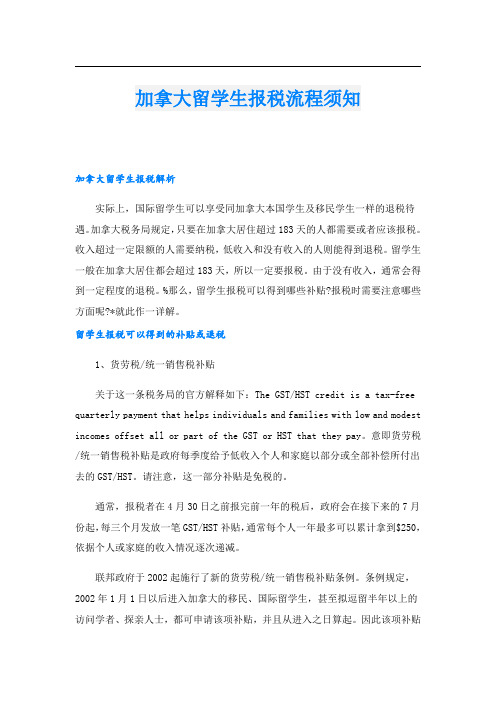
加拿大留学生报税流程须知加拿大留学生报税解析实际上,国际留学生可以享受同加拿大本国学生及移民学生一样的退税待遇。
加拿大税务局规定,只要在加拿大居住超过183天的人都需要或者应该报税。
收入超过一定限额的人需要纳税,低收入和没有收入的人则能得到退税。
留学生一般在加拿大居住都会超过183天,所以一定要报税。
由于没有收入,通常会得到一定程度的退税。
%那么,留学生报税可以得到哪些补贴?报税时需要注意哪些方面呢?*就此作一详解。
留学生报税可以得到的补贴或退税1、货劳税/统一销售税补贴关于这一条税务局的官方解释如下:The GST/HST credit is a tax-free quarterly payment that helps individuals and families with low and modest incomes offset all or part of the GST or HST that they pay。
意即货劳税/统一销售税补贴是政府每季度给予低收入个人和家庭以部分或全部补偿所付出去的GST/HST。
请注意,这一部分补贴是免税的。
通常,报税者在4月30日之前报完前一年的税后,政府会在接下来的7月份起,每三个月发放一笔GST/HST补贴,通常每个人一年最多可以累计拿到$250,依据个人或家庭的收入情况逐次递减。
联邦政府于2002起施行了新的货劳税/统一销售税补贴条例。
条例规定,2002年1月1日以后进入加拿大的移民、国际留学生,甚至拟逗留半年以上的访问学者、探亲人士,都可申请该项补贴,并且从进入之日算起。
因此该项补贴也被称为“落地税”。
值得注意的是这项补贴即使您有权得到,您仍须申请。
如不申请,政府不会主动付给您这项补贴。
所以留学生要想收到这项补贴,首先必须要完成报税。
2、住房补贴符合报税条件的安省居民,也包括含国际留学生,如果支付了房租并且无收入或者低收入可以得到部分房租补贴。
新加坡税收协定及议定书
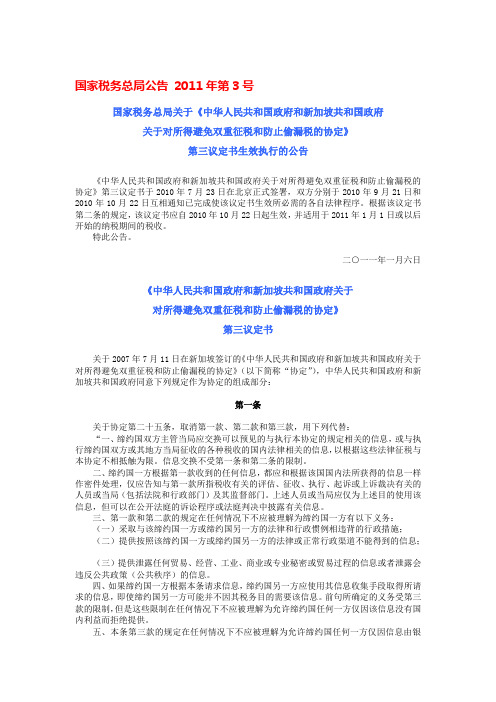
国家税务总局公告2011年第3号国家税务总局关于《中华人民共和国政府和新加坡共和国政府关于对所得避免双重征税和防止偷漏税的协定》第三议定书生效执行的公告《中华人民共和国政府和新加坡共和国政府关于对所得避免双重征税和防止偷漏税的协定》第三议定书于2010年7月23日在北京正式签署,双方分别于2010年9月21日和2010年10月22日互相通知已完成使该议定书生效所必需的各自法律程序。
根据该议定书第二条的规定,该议定书应自2010年10月22日起生效,并适用于2011年1月1日或以后开始的纳税期间的特此公告。
二○一一年一月六日《中华人民共和国政府和新加坡共和国政府关于对所得避免双重征税和防止偷漏税的协定》第三议定书关于2007年7月11日在新加坡签订的《中华人民共和国政府和新加坡共和国政府关于对所得避免双重征税和防止偷漏税的协定》(以下简称“协定”),中华人民共和国政府和新第一条“一、缔约国双方主管当局应交换可以预见的与执行本协定的规定相关的信息,或与执行缔约国双方或其地方当局征收的各种税收的国内法律相关的信息,以根据这些法律征税与二、缔约国一方根据第一款收到的任何信息,都应和根据该国国内法所获得的信息一样作密件处理,仅应告知与第一款所指税收有关的评估、征收、执行、起诉或上诉裁决有关的人员或当局(包括法院和行政部门)及其监督部门。
上述人员或当局应仅为上述目的使用该三、第一款和第二款的规定在任何情况下不应被理解为缔约国一方有以下义务(二)提供按照该缔约国一方或缔约国另一方的法律或正常行政渠道不能得到的信息;(三)提供泄露任何贸易、经营、工业、商业或专业秘密或贸易过程的信息或者泄露会违反公共政策(公共秩序)的信息。
四、如果缔约国一方根据本条请求信息,缔约国另一方应使用其信息收集手段取得所请求的信息,即使缔约国另一方可能并不因其税务目的需要该信息。
前句所确定的义务受第三款的限制,但是这些限制在任何情况下不应被理解为允许缔约国任何一方仅因该信息没有国内利五、本条第三款的规定在任何情况下不应被理解为允许缔约国任何一方仅因信息由银行、其他金融机构、名义代表人、代理人或受托人所持有,或因信息与人的所有权益有关,而拒绝提供。
加拿大活动物和畜产品税率
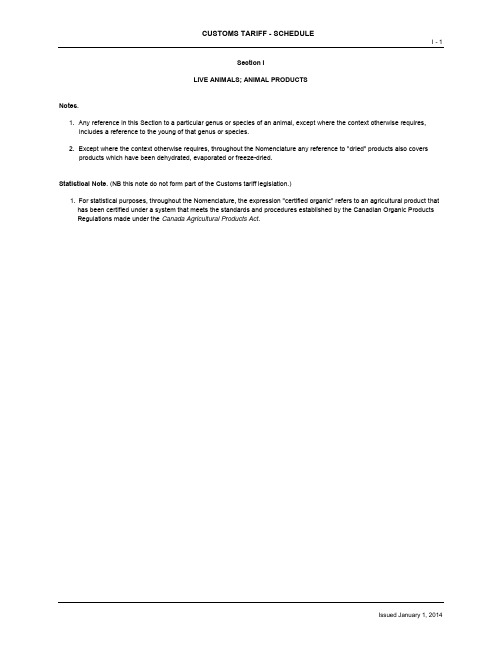
Section ILIVE ANIMALS; ANIMAL PRODUCTSNotes.1. Any reference in this Section to a particular genus or species of an animal, except where the context otherwise requires,includes a reference to the young of that genus or species.2. Except where the context otherwise requires, throughout the Nomenclature any reference to "dried" products also coversproducts which have been dehydrated, evaporated or freeze-dried.Statistical Note. (NB this note do not form part of the Customs tariff legislation.)1. For statistical purposes, throughout the Nomenclature, the expression "certified organic" refers to an agricultural product thathas been certified under a system that meets the standards and procedures established by the Canadian Organic Products Regulations made under the Canada Agricultural Products Act.Chapter 1LIVE ANIMALSNote.1. This Chapter covers all live animals except:(a) Fish and crustaceans, molluscs and other aquatic invertebrates, of heading 03.01, 03.06, 03.07 or 0308;(b) Cultures of micro-organisms and other products of heading 30.02; and(c) Animals of heading 95.08.Supplementary Note.1. For the purpose of heading 01.01 to 01.04 inclusive, the expression "pure-bred breeding animals" applies only to animalscertified by the Director of the Canadian National Livestock Records or the Secretary of any other governing association incorporated under the Livestock Pedigree Act as being "pure-bred", imported specially for breeding purposes.01 - 1 CUSTOMS TARIFF - SCHEDULETariff Item SS Description of GoodsUnit ofMeas.MFNTariffApplicablePreferential Tariffs01.01Live horses, asses, mules and hinnies.-Horses:0101.21.0000- -Pure-bred breeding animals NMB Free CCCT, LDCT, GPT, UST,MT, CT, CRT, IT, PT,COLT, JT, PAT:Free 0101.29.00- -Other Free CCCT, LDCT, GPT, UST,MT, CT, CRT, IT, PT,COLT, JT, PAT:Free 10- - - - -For slaughter..........................................................................................NMB20- - - - -For racing...............................................................................................NMB90- - - - -Other......................................................................................................NMB0101.30.0000-Asses NMB Free CCCT, LDCT, GPT, UST,MT, CT, CRT, IT, PT,COLT, JT, PAT:Free 0101.90.0000-Other NMB Free CCCT, LDCT, GPT, UST,MT, CT, CRT, IT, PT,COLT, JT, PAT:Free 01.02Live bovine animals.-Cattle:0102.21.00- -Pure-bred breeding animals Free CCCT, LDCT, GPT, UST,MT, CT, CRT, PT, COLT,JT, PAT:Free 10- - - - -Dairy.......................................................................................................NMB90- - - - -Other......................................................................................................NMB0102.29.00- -Other Free CCCT, LDCT, GPT, UST,MT, CT, CRT, PT, COLT,JT, PAT:Free 10- - - - -Dairy.......................................................................................................NMB90- - - - -Other......................................................................................................NMB-Buffalo:0102.31.0000- -Pure-bred breeding animals NMB Free CCCT, LDCT, GPT, UST,MT, CT, CRT, PT, COLT,JT, PAT:Free0102.39.0000- -Other NMB Free CCCT, LDCT, GPT, UST,MT, CT, CRT, PT, COLT,JT, PAT:Free0102.90.0000-Other NMB Free CCCT, LDCT, GPT, UST,MT, CT, CRT, PT, COLT,JT, PAT:Free01.03Live swine.01 - 20103.10.0000-Pure-bred breeding animalsNMBFreeCCCT, LDCT, GPT, UST, MT, CT, CRT, PT, COLT, JT, PAT:Free-Other:0103.91.0000- -Weighing less than 50 kgNMBFreeCCCT, LDCT, GPT, UST, MT, CT, CRT, PT, COLT, JT, PAT:Free0103.92.0000- -Weighing 50 kg or more NMB FreeCCCT, LDCT, GPT, UST, MT, CT, CRT, PT, COLT, JT, PAT:Free01.04Live sheep and goats.0104.10.00-SheepFreeCCCT, LDCT, GPT, UST, MT, CT, CRT, PT, COLT, JT, PAT:Free10- - - - -Pure-bred breeding animals...................................................................NMB 90- - - - -Other ......................................................................................................NMB0104.20.00-GoatsFreeCCCT, LDCT, GPT, UST, MT, CT, CRT, PT, COLT, JT, PAT:Free10- - - - -Pure-bred breeding animals...................................................................NMB 90- - - - -Other ......................................................................................................NMB01.05Live poultry, that is to say, fowls of the species Gallus domesticus , ducks, geese, turkeys and guinea fowls.-Weighing not more than 185 g:0105.11- -Fowls of the species Gallus domesticus0105.11.1000- - -For breeding purposes NMB FreeCCCT, LDCT, GPT, UST, MT, CT, CRT, PT, COLT, JT, PAT:Free- - - Broilers for domestic production:0105.11.2100- - - - Within access commitmentNMB0.86¢eachCCCT, LDCT, UST, CT, PT, JT:FreeCOLT: 0.36¢each0105.11.2200- - - -Over access commitment NMB238% but not less than 30.8¢each0105.11.9000- - -Other NMBFreeCCCT, LDCT, GPT, UST, MT, CT, CRT, PT, COLT, JT, PAT:Free0105.12- -TurkeysCUSTOMS TARIFF - SCHEDULETariffItemSSDescription of GoodsUnit of Meas.MFN TariffApplicable Preferential Tariffs01 - 30105.12.1000- - -For breeding purposesNMBFreeCCCT, LDCT, GPT, UST, MT, CT, CRT, PT, COLT, JT, PAT:Free0105.12.9000- - -Other NMB 8%CCCT, LDCT, GPT, UST, MT, CT, CRT, PT, COLT, JT, PAT:Free0105.13- -Ducks0105.13.1000- - -For breeding purposesNMBFreeCCCT, LDCT, GPT, UST, MT, CT, CRT, PT, COLT, JT, PAT:Free0105.13.9000- - -Other NMB 8%CCCT, LDCT, GPT, UST, MT, CT, CRT, PT, COLT, JT, PAT:Free0105.14- -Geese0105.14.1000- - -For breeding purposesNMBFreeCCCT, LDCT, GPT, UST, MT, CT, CRT, PT, COLT, JT, PAT:Free0105.14.9000- - -Other NMB 8%CCCT, LDCT, GPT, UST, MT, CT, CRT, PT, COLT, JT, PAT:Free0105.15- -Guinea fowls0105.15.1000- - -For breeding purposes NMB FreeCCCT, LDCT, GPT, UST, MT, CT, CRT, PT, COLT, JT, PAT:Free0105.15.9000- - -Other NMB 2.5%CCCT, LDCT, GPT, UST, MT, CT, CRT, PT, COLT, JT, PAT:Free-Other:0105.94 - -Fowls of the species Gallus domesticus 0105.94.10- - -For breeding purposes;Spent fowl;Started pullets2.82¢/kgCCCT, LDCT, UST, CT, CRT, PT, COLT, JT:Free- - - - -For breeding purposes;Started pullets:11- - - - - -Weighing not more than 2,000 g..........................................................KGM 12- - - - - -Weighing more than 2,000 g................................................................KGM 20- - - - -Spent fowl ..............................................................................................KGM- - -Other:CUSTOMS TARIFF - SCHEDULETariffItemSSDescription of GoodsUnit of Meas.MFN TariffApplicable Preferential Tariffs01 - 40105.94.91- - - -Within access commitment1.9¢/kgCCCT, LDCT, UST, CT, JT:FreePT: 0.27¢/kg COLT: 0.81¢/kg10- - - - -Weighing not more than 2,000 g ............................................................KGM 20- - - - -Weighing more than 2,000 g ..................................................................KGM0105.94.92- - - -Over access commitment238% but not less than $1.25/kg10- - - - -Weighing not more than 2,000 g ............................................................KGM 20- - - - -Weighing more than 2,000 g ..................................................................KGM0105.99- -Other - - -Turkeys:0105.99.1100- - - -Within access commitmentKGM 1.9¢/kgCCCT, LDCT, UST, CT, JT:FreePT: 0.27¢/kg COLT: 0.81¢/kg PAT: 1.14¢/kg0105.99.1200- - - -Over access commitment KGM154.5% but not less than $1.60/kg0105.99.9000- - -Other KGM3%CCCT, LDCT, UST, CT, CRT, PT, COLT, JT, PAT:Free01.06Other live animals.-Mammals:0106.11.0000- -Primates NMB FreeCCCT, LDCT, GPT, UST, MT, CT, CRT, PT, COLT, JT, PAT:Free0106.12.0000- -Whales, dolphins and porpoises (mammals of the order Cetecea);manatees and dugongs (mammals of the order Sirenia); seals, sea lions and walruses (mammals of the suborder Pinnipedia)NMB FreeCCCT, LDCT, GPT, UST, MT, CT, CRT, PT, COLT, JT, PAT:Free0106.13.0000- -Camels and other camelids (Camelidae)NMB FreeCCCT, LDCT, GPT, UST, MT, CT, CRT, PT, COLT, JT, PAT:Free0106.14.0000- -Rabbits and hares NMB FreeCCCT, LDCT, GPT, UST, MT, CT, CRT, PT, COLT, JT, PAT:Free0106.19.00- -Other FreeCCCT, LDCT, GPT, UST, MT, CT, CRT, PT, COLT, JT, PAT:Free10- - - - -Minks......................................................................................................NMB 90- - - - -Other ......................................................................................................NMBCUSTOMS TARIFF - SCHEDULETariffItemSSDescription of GoodsUnit of Meas.MFN TariffApplicable Preferential Tariffs01 - 50106.20.0000-Reptiles (including snakes and turtles)NMBFreeCCCT, LDCT, GPT, UST, MT, CT, CRT, PT, COLT, JT, PAT:Free-Birds:0106.31.0000- -Birds of preyNMBFreeCCCT, LDCT, GPT, UST, MT, CT, CRT, PT, COLT, JT, PAT:Free0106.32.0000- -Psittaciformes (including parrots, parakeets, macaws and cockatoos)NMB FreeCCCT, LDCT, GPT, UST, MT, CT, CRT, PT, COLT, JT, PAT:Free0106.33.0000- -Ostriches; emus (Dromaius novaehollandiae)NMB FreeCCCT, LDCT, GPT, UST, MT, CT, CRT, PT, COLT, JT, PAT:Free0106.39.00- -Other FreeCCCT, LDCT, GPT, UST, MT, CT, CRT, PT, COLT, JT, PAT:Free10- - - - -Pet or song birds....................................................................................NMB 90- - - - -Other......................................................................................................NMB-Insects:0106.41.00- -BeesFreeCCCT, LDCT, GPT, UST, MT, CT, CRT, PT, COLT, JT, PAT:Free- - - - -Honey bees, not including queen bees:11- - - - - -In packages of a weight not exceeding 1 kg........................................NAP 12- - - - - -In packages of a weight exceeding 1 kg..............................................NAP 20- - - - -Queen bees............................................................................................NMB 90- - - - -Other......................................................................................................- 0106.49.0000- -Other-FreeCCCT, LDCT, GPT, UST, MT, CT, CRT, PT, COLT, JT, PAT:Free0106.90.00-Other FreeCCCT, LDCT, GPT, UST, MT, CT, CRT, PT, COLT, JT, PAT:Free10- - - - -Bait.........................................................................................................- 90- - - - -Other......................................................................................................-CUSTOMS TARIFF - SCHEDULETariffItemSSDescription of GoodsUnit of Meas.MFN TariffApplicable Preferential Tariffs。
- 1、下载文档前请自行甄别文档内容的完整性,平台不提供额外的编辑、内容补充、找答案等附加服务。
- 2、"仅部分预览"的文档,不可在线预览部分如存在完整性等问题,可反馈申请退款(可完整预览的文档不适用该条件!)。
- 3、如文档侵犯您的权益,请联系客服反馈,我们会尽快为您处理(人工客服工作时间:9:00-18:30)。
J a m i e G o l o m b e kFederal Budget 2010: Personal and SmallBusiness Tax AnnouncementsFederal Budget 2010 introduced several specific tax measures targeting individuals and corporations. The focus of this report is to focus on a few key elements of the 2010 Budget that affect personal and corporate taxation.Employee Stock OptionsAfter years of painstaking lobbying, relief has finally arrived to many employees who exercised employee stock options, deferring their tax obligations until the date of sale of the underlying shares, which in many cases, have since plummeted in value.The relief contained in the Federal Budget is available to all affected employees, unlike the November 2007 remission order, forgiving both income taxes and arrears interest of thirty-five ex-employees of SDL Optics, Inc. (since acquired by JDS Uniphase) that arose from participation in their employer’s stock purchase plan.Under Canadian tax law, if you purchase shares through either an employee stock purchase plan or by exercising an employee stock option, your taxable employment benefit (and thus your tax liability) is based on the difference between the price you paid for the shares and the fair market value of shares on the date you receive them.A stock option benefit deduction equal to 50 per cent is available to tax the stock option at capital gains-type rates, even though it’s still classified as taxable employment income.While the value of the taxable benefit is fixed when the shares are acquired, taxation of the benefit can generally be deferred until the year you sell the shares, at which time the shares may have substantially dropped in value. The allowable capital loss arising at the time of disposition cannot be used to offset the taxable employment benefit.It is this mismatch of capital loss against employment income that has sparked intense lobbying by various employee groups, especially in the high-tech sector who face massive tax bills on money they never "received.”The 2010 Federal Budget proposed a number of measures directed at this issue.First, to deal specifically with individuals who elected to defer paying tax on their stock option benefits until sale, the government introduced a new special elective tax treatment to ensure that the tax liability on a deferred stock option benefit won’t exceed the fair market value of the shares being sold.For example, let’s say Jay’s employer has a stock option plan and he was granted the option to purchase 1,000 shares of his employer at $20 per share.Jay exercised that option when the market price of the shares was $220. Rather than sell the shares, he decided to hang on to them. By filing an election in the year of exercise, Jay was able to defer paying tax on this option benefit until he chose to sell the shares.The stock option benefit deferred was $200,000, equal to the difference between what he paid ($20,000) and what the stock was worth when he exercised his option ($220,000).This benefit, while not a capital gain, is taxed at the same rate as a capital gain – i.e. at 50% of your marginal tax rate – but is considered to be employment income.The problem arises when Jay decides to sell his shares, which, given recent market conditions, have been pummeled and are now worth a mere $10 each.As a result, Jay will receive proceeds on the sale of $10,000 and realize a loss of $210,000 ($10,000 – $220,000). This loss is considered to be a capital loss and thus can only be used to offset other capital gains. Nor can it be applied against the deferred employment benefit of $200,000, on which tax becomes due in the year of sale, even though this benefit was taxed at the same rate as a capital gain.Under the new rules, if Jay elects to have them apply, instead of paying tax at capital gains rates of about 25% on his employment benefit of $200,000 or $50,000, he could pay the special tax equal to his proceeds of disposition of $10,000.This relief is also available to any employee who sold shares acquired upon exercising options before 2010, provided the election is filed before the 2010 tax filing deadline (generally April 30, 2011). It will also apply to individuals who have not yet disposed of their optioned shares, as long as they dispose of them before 2015 and elect by the filing deadline for the year of disposition.Secondly, the government has eliminated the tax deferral election effective immediately, such that an employee can no longer defer paying tax on the stock option benefit until the year of sale.Finally, to ensure it collects its taxes when such options are exercised, the government will now insist on collecting the required income tax withholding when the options are exercised. Employers will be required to withhold tax at source for the period in which the employee exercised the option.In a somewhat related budget announcement, the government is also cracking down on employee stock option plans that permit employees to dispose of their stock option rights for a cash payment from their employer.Currently, the employer can deduct the cost of such cash payments while employees are still entitled to the 50 per cent stock option benefit deduction.Under new proposals, for employees to be able to get this 50 per cent deduction, they must either exercise their options for shares, or their employer will have to file an election promising to forgo its deduction for the cash payment. If they don’t, employees will be fully taxable on the value of such cash payments.Registered Disability Savings Plan (RDSPs)Registered Disability Savings Plans (RDSPs) were introduced in the 2007 Federal Budget to help parents and others save for the long-term financial security of a child with a severe disability. The RDSP is a tax-assisted savings vehicle which allows investment income to accumulate tax-deferred while attracting generous government benefits, such as the Canada Disability Savings Grants (CDSGs) and Canada Disability Savings Bonds (CDSBs).Federal Budget 2010 has proposed two positive changes surrounding planning for a disabled beneficiary using RDSPs: the ability to roll over Registered Retirement Savings Plan (RRSP) or Registered Retirement Income Fund (RRIF) proceeds upon death to an RDSP and the carryforward of unused CDSGs and CDSBs.Rollover of RRSP of RRIF Proceeds to an RDSPThe general rule is that when the annuitant of an RRSP or RRIF dies, the fair market value of the RRSP or RRIF as of the date of death is fully taxable to the deceased, unless a qualifying rollover applies.For example, if the RRSP or RRIF is left to a surviving spouse or common-law partner, or to children or grandchildren who were financially dependent on the deceased RRSP or RRIF annuitant the proceeds can be taxed in the survivor’s hands instead of the deceased’s return.Furthermore, if RRSP or RRIF proceeds upon death are left to a surviving spouse or partner or a child or grandchild who was dependant on the deceased because of a physical or mental disability, the fair market value of the RRSP or RRIF could be rolled over tax-deferred into the RRSP of the surviving spouse, partner or dependant child or grandchild. A rollover is also available for a child or grandchild who is financially dependent but without any disability, but only to an annuity to age 18.The 2010 Federal Budget proposes that the RRSP rollover rules be extended to permit a tax-deferred rollover upon death of funds from a parent or grandparent’s RRSP to the RDSP of a “financially dependent” disabled child or grandchild.Generally speaking, a disabled child or grandchild is considered to be “financially dependent” if the child’s income for the year preceding the year of death was less than $17,621 (for 2010). That being said, a disabled child who has a higher income level may still be considered financially dependent, but only if such dependency can be factually determined.The total amount of RRSP or RRIF proceeds that can be rolled over cannot exceed the disabled beneficiary’s available RDSP contribution room, which is equal to the lifetime contribution limit of $200,000 less prior years’ RDSP contributions. The rolled over amount will not attract CDSGs.In addition, since the amount of RRSP proceeds rolled over on a tax deferred basis to an RDSP will never have been taxed, the amount rolled over (excluding any future income and growth on this amount) will form part of the portion of a disability assistance payment that will ultimately be included in the beneficiary’s income when withdrawn from the RDSP.To qualify for the rollover, the RDSP beneficiary (or his or her legal representative) must file an election with both the CRA and HRSDC at the time the RDSP contribution is made.Special transitional rules have also been introduced for RRSP and RRIF annuitants who died since 2008 which would effectively allow an “eligible individual” to elect to contribute up to the amount of a deceased annuitant’s RRSP or RRIF proceeds to the RDSP of a disabled child or grandchild of the deceased who was financially dependent on the deceased annuitant (subject, as discussed above) to available RDSP contribution room.An “eligible individual” is either a direct beneficiary of the deceased’s RRSP or RRIF or someone who received RRSP or RRIF proceeds through the deceased annuitant’s estate. Provided the contribution is made before 2012, anoffsetting deduction will be available either on the deceased annuitant’s terminal tax return for the year of death or on that of the eligible individual making the contribution, as appropriate.Note that no contributions from the rollover can be made prior to July 2011. This is to give RDSP providers the time to implement the necessary system changes.Carry Forward of CDSGs and CDSBsUnder the RDSP rules, annual contributions can attract CDSGs of up to $3,500, depending on the beneficiary’s family income and the amount contributed, up to a lifetime maximum of $70,000. For 2010, the CDSGs are equal to 300% on the first $500 of annual contributions and up to 200% on the next $1,000. When family income is over $81,941, the CDSG is equal to 100% on the first $1,000 of annual contributions.As well, CDSBs of up to $1,000 annually can also be paid into RDSPs for lower income families, based on the disabled beneficiary’s family income, up to a lifetime maximum of $20,000. For 2010, CDSBs begin to phase out for incomes above $23,855 and are fully phased-out at $40,970.Until the 2010 Budget, Beneficiaries were unable to carry forward unused CDSG and CDSB entitlements to future years. The Federal Budget introduces a new 10-year carry forward of CDSG and CDSB entitlements.When an RDSP is established, CDSGs will be paid on unused entitlements for the preceding 10 years, but no earlier than 2008, the year the RDSP first became available, up to an annual maximum of $10,500. CDSB entitlements will also be determined and paid into the plan for each prior year. Both CDSGs and CDSBs will be based on the beneficiary’s family income in those particular years.Cosmetic SurgeryUnder the Income Tax Act, individuals are permitted to claim a federal 15% Medical Expense Tax Credit (METC) for medical and disability-related expenses above the lesser of $2,024 and three per cent of net income.Generally, a medical expense qualifies for the METC if is directly related to a disability or a medical condition. According to the government, “an expense is not generally intended to be eligible if it is ordinarily incurred by persons without a disability or a medical condition or has a substantial element of personal consumption and choice.”To this end, effective March 5, 2010, any expenses incurred for purely cosmetic procedures, including related travel expenses, will be not be eligible for the METC. This would include both surgical and non-surgical procedures aimed purely to enhance one’s appearance. These would include liposuction, hair replacement procedures, Botox injections, and teeth whitening.However, cosmetic procedures required for medical or reconstructive purposes, such as surgery performed in conjunction with a personal injury or disfiguring disease will still qualify.Prior to this announcement, it was the CRA’s longstanding administrative position that any amount paid to a medical practitioner for surgery of any kind, whether cosmetic or elective, would qualify for the METC since it was “presumed that such surgery is beneficial to the patient's health.”Corporate Taxpayers – Interest on Overpaid TaxesResponding to criticism in the most recent Auditor General’s report about corporations receiving interest on overpaid taxes at higher than market rates, Federal Budget 2010 has changed the rules for how interest is calculated on overpaid taxes by corporations.Under the existing rule, the government pays interest on overpaid taxes at the prescribed rate plus two per cent. The prescribed rate is equal to the average yield of three-month Government of Canada Treasury Bills sold in the first month of the preceding quarter, rounded up to the nearest percentage.The budget proposes that effective for the third quarter of 2010, the interest rate payable by the CRA on overpaid taxes to corporations will simply be the prescribed rate, currently set at 1%. This new rate for corporations will apply to income taxes, GST/HST, EI premiums, CPP contributions among other amounts.This new lower rate, however, will not apply to individuals.As with all planning strategies, you should seek the advice of a qualified financial or tax advisor to discuss how the changes in the federal budget could impact your financial plans.Jamie Golombek, CA, CPA, CFP, CLU, TEP is the Managing Director, Tax & Estate Planning with CIBC Private Wealth Management in Toronto. As a member of the CIBC Retail Markets team, Jamie works closely with advisors from CIBC Private Wealth Management, Wood Gundy, Imperial Service and other partners to support their high net worth clients and deliver integrated financial planning and strong advisory solutions. He joined the firm in 2008 after 12 years with AIM Trimark, where he was involved in both internal and external consulting on all areas of taxation and estate planning. Jamie has also worked for Deloitte & Touche as a tax specialist in the Toronto office, where he specialized in both personal and corporate tax planning.Jamie.Golombek@This report is published by CIBC with information that is believed to be accurate at the time of publishing. CIBC and its subsidiaries and affiliates are not liable for any errors or omissions. This report is intended to provide general information and should not be construed as specific legal, lending, or tax advice. Individual circumstances and current events are critical to sound planning; anyone wishing to act on the information in this report should consult with his or her Advisor and tax specialist.。
